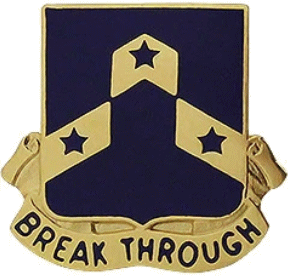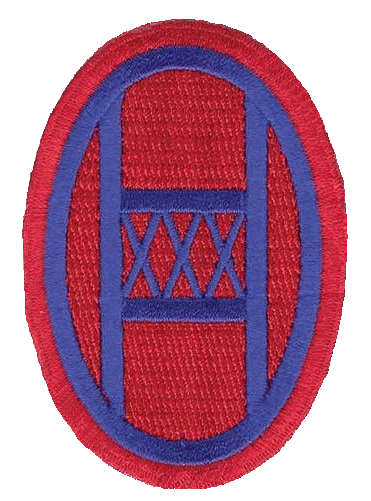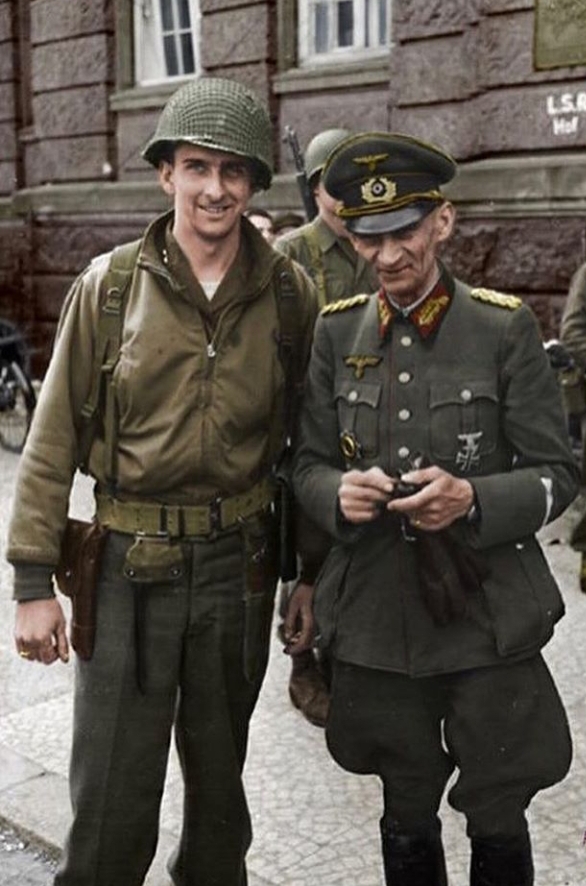


3rd Battalion - K Company
30th Infantry Division



The Capture of Lt. General Kurt von Dittmar
The morning of April 25th 1945, was foggy, wet, and cold. This day was not unlike many others in the long march from the Normandy beaches for Sgt. Frank DeClerck of the 117th Infantry Regiment. His outfit had reached the Elbe River in central Germany near the medieval city of Magdeburg. Sitting in his single man fox hole along the Elbe, many thoughts ran through his head. They had just taken the city days before and he thought that the German's would never stand for that. They always counter attacked and tried to re-take lost ground. Could the young boys in his charge withstand such an attack? Probably not. The fox holes were spread-out in a line about 25 yards apart along the river. The line was just too thin. A determined attack by a division of Germans could easily overrun their position. Yes, the river was in front of them to the east, but he knew the line would not hold a full blown attack. This citizen soldier had only 9 months of active battlefield experience, but it felt a life time to him - a life time of sheer terror. His experiences taught him that more violence was sure to come and he must prepare himself and his men. Over the past months he learned to become a hunter of men using all of his skill to kill and not be killed. It became easier to kill the German when you saw one of your own fall. Everything seemed peaceful now, a sure sign that something was up. In these situations, he also became very quiet but stealthy, using hand signals, keeping his head down, and admonishing the young GI's, his GI's, to do same. Of course, these youngsters knew there was trouble when the sergeant's demeanor changed. They better be locked and loaded, but never fire until the "Sarge" fires first. At such times, GI's are often killed by friendly fire due to inexperience! Frank had better training than these fresh recruits prior to coming to France.
DeClerck's feet felt soggy and wet, just like he did in the "Bacage" (Hedgerow) fighting in Northern France where he killed his first German up close and personal. He still suffered with a constant memory of that German boy's agonized face as he died. He would never forget. He learned that it is better to kill a a distance, take no chances, never hesitate, just shoot and don't look at their faces.
He decided that if the Germans came, he and his small group make a short stand then retreat to a better position in the rear. He didn't like giving up ground, but in this case, the odds were stacked against him.
The Elbe seemed calm that morning - no one could see 20 or 30 feet ahead, let alone the other side of the river. Suddenly a splash. The young GI's eyes grew wider. No, just a fish. This simple noise reminded Frank of the noises that he heard on a cold night in the Ardennes Forest during the Battle of the Bulge a few months back. The noise were of blowing snow, tree sounds like rustling evergreens, some animal sounds but nothing alarming. Then the sound of crunching snow, very slow but distant. Then a muffled shot followed by a scream. Then quiet again. He could never get his mind off his cold freezing feet. Frank thoughts at that time were that he would rather have wet feet than freezing feet. No thought that someone just died on that winter's night. Such is war he thought with great sadness in this stinking little fox hole on the Elbe where time had no meaning. Sometimes the fighting in the Ardennes seemed like yesterday; at other times it seemed like an eternity ago.
Frank then hear someone talking at distance. He thought that his men were taking to one in an their adjoining fox holes. Frustrated, DeClerck climbed back out of his fox hole to admonish the offenders when he heard series of small splashes. Those weren't fish! Those were oar splashes! Frank jumped back into his fox hole. Using hand signals to his men, the GI's became very quite and raised their shaking rifles. This is it, they're coming. Slowly a single boat appeared out of the fog. A voice was yelling "truce - truce." DeClerck took careful aim. He ordered his men to take aim as well - "get ready - this could it - another dirty stinking SS trick!" Slowly a white flag appeared. As the boat carried onto on the shore, DeClerck could see 5 people in it; 2 German Officers, 2 German Soldiers and a boy.
Sgt Frank DeClerck signaled his GI's to kill all the Germans if any thing happened to him as he approached them. Apparently, one of the German Officers understood Frank's orders and indicated to the others to raise their hands as they were climbing out of the boat. Everyone complied as DeClerck approached them. Indicating with his rifle that they should keep their hands raised. As one German Officer approached, he introduced himself as Major Pluskat, an artillery officer. The major then introduced Lt. General Kurt von Dittmar. The General saluted the Sergeant. DeClerck did not return the salute but stood silent. The general then explained that he wanted to speak with the officers from his Division about aid for German wounded on the east side of the Elbe. Frank then nodded. As DeClerck looked at the two soldiers and the young boy, the Major explained that the two soldiers were the general's orderlies and the boy was his son. DeClerck now clearly understood the real mission of this group. They really wanted to surrender to the Americans and not the Russians.
DeClerck ordered several of his men to search and guard the group while he went to see Captain Abbes, K Company Commander, in the rear. As DeClerck approached his commander's bunker in the fog, he called out the codeword, and approached the captain. He reported that five Germans waving a flag of truce wanted to talk with the senior ranking officer of the division. Captain Abbes was totally astonished but reacted quickly. He thanked Sergeant DeClerck and grabbed the Walkie-Talkie: "Colonel I got a surprise for you!"
 Captain Henry Abbes, K Company Commander, 117th Infantry Regiment with Lt. Commander Kurt von Dittmar after his surrender on April 25th, 1945. |
Captain Abbes took the five Germans via Jeep to his superior, Lieutenant Colonel Samuel T. McDowell, Commander of 3rd Battalion of the117th Infantry Regiment. From there, Lt. Colonel McDowell took the Germans to the 117th Infantry Regiment Command post in Magdeburg and turned them over to the Regiment Commander, Colonel Walter M. Johnson. After interviewing Lt. General Dittmar, he scheduled a meeting with Major General Leland S. Hobbs, Commanding Officer of the 30th Infantry Division. About 1 pm, Lt. General Dittmar met with Major General Hobbs and presented his request that aid was needed for German wounded on the east bank of the Elbe. During the meeting, it was determined that Dittmar commanded no troops and traveled to the west without the knowledge of the official German commander in that sector. The German General said he was the Official Military Commentator of the German Armed Forces.
During interviews with Dittmar, Hobbs learned that the National Redoubt (secret German Army) did not exist and that Hitler was in Berlin and would probably die there. This was vital information.
|
German Lt. General Kurt von Dittmar with his son, Bertend, sitting next to U.S. Major General Leland S. Hobbs, Commanding Officer of the 30th Infantry Division, in April 25, 1945, in Magdeburg, Germany. |
It was evident to General Hobbs that Dittmar did not have the authority over the German troops on the other side of the Elbe. As a result, he could not comply with Dittmer's request for help unless all of the Germans surrendered unconditionally. Guessing the real reason why Dittmar was there, he told Dittmar that he and his group could surrender but Dittmar refused. After the meeting was over and as the Germans were leaving, Major Pluskat had no reservations and surrendered immediately to the Americans. Hobbs then ordered that that Dittmar along with his son and orderlies be given safe conduct back to their boat on the Elbe. It was on his way back to re-cross the river that Dittmar had a change of heart. He then decided to surrender along with his son and orderlies. Dittmar knew that the war was over and that he could do little good for the wounded Germans on the over side of the Elbe. Of course, his real plan was to save his own life and that of his son. Lt. General Dittmar and his entire group were now prisoners of war.
Additional Pages (Click Below)
© Copyrighted 2007 by Darrel R Hagberg. All rights reserved.
Moline, Illinois U.S.A.
February 24, 2023
Contact darrelrhagberg@gmail.com for more information